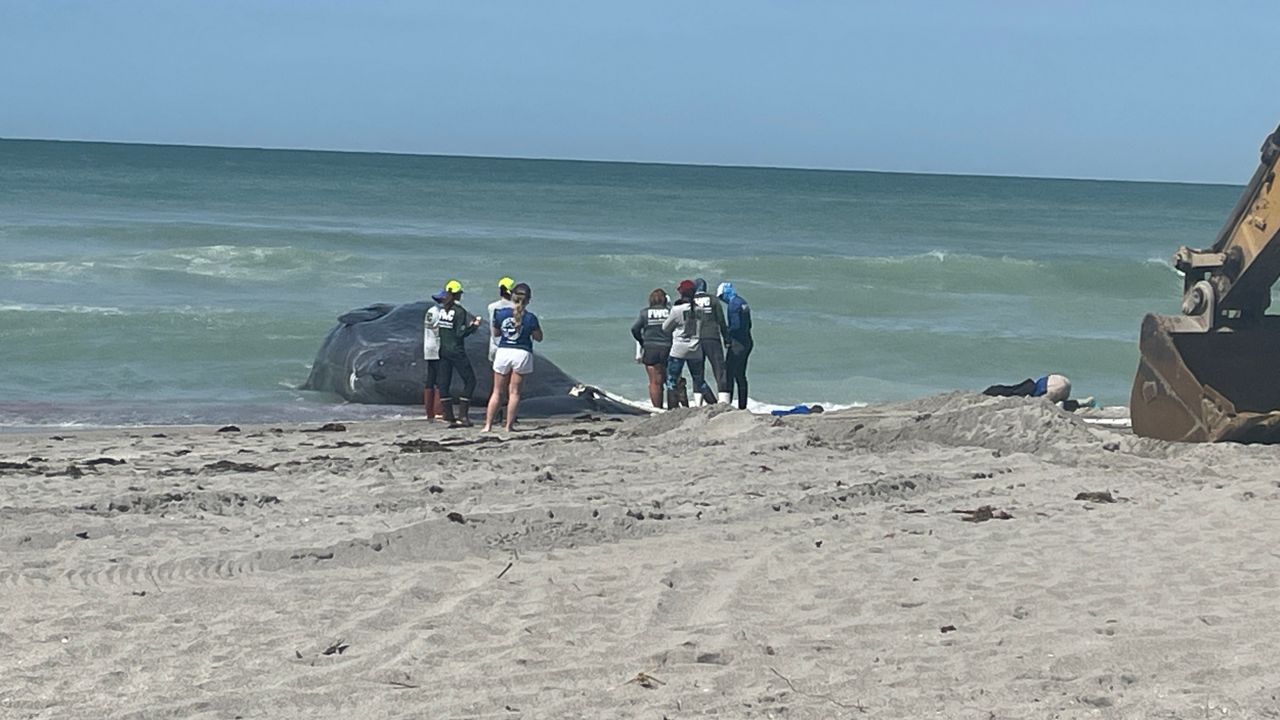SARASOTA COUNTY, Fla. — Crews with the Florida Fish and Wildlife Conservation Commission towed the body of a dead beached whale back out to sea Tuesday.
What You Need To Know
- Florida Fish and Wildlife Conservation Commission crews towed the body of a dead, beached sperm whale back out to sea Tuesday afternoon
- The 44-foot, 77,000-pound male sperm whale died Monday on Venice Beach after becoming beached on a sandbar over the weekend
- The necropsy report could take months to determine the cause of death
The 44-foot, 77,000-pound male sperm whale died Monday on Venice Beach after becoming beached on a sandbar over the weekend. Crews used two boats, a rope and a crane to move the whale off the shore.
Crews on Monday were taking tissue samples as part of a necropsy report from the whale.
“It’s a gut punch,” said Gretchen Lovewell with Mote Marine Laboratory and Aquarium. “(We) desperately wanted to get there to it yesterday and we couldn’t do it safely.
“Now we are putting on our science hats to make the best out of a bad situation to make sure this animal doesn’t die in vain to learn as much as we can about this animal and hopefully help the rest that are out there.”
The whale was found struggling on a sandbar this weekend, officials with the Florida Fish and Wildlife Conservation Commission said.
At noon Monday, officials said they were waiting on heavy machinery to tow the whale onto the beach so samples could be taken from different parts of the whale, externally and internally, to determine how it died.
They are also warning residents to stay clear of the area because fluid from the whale can attract sharks.
“We are going to look at every single system that we can," she said.
Once crews are done taking samples, officials say they will move the whale back into the Gulf of Mexico.
The Venice Police Department said in posts on Facebook that the whale was alive on Sunday afternoon after it had beached on a sandbar about 50 yards from Service Club Park.
On Monday, a no swim advisory was issued for the area.
As of Sunday evening, the whale was still alive, but experts said it was having trouble breathing.
“Obviously this whale wasn’t feeling very well and doing very well to be this close to shore, and in this condition it’s thin. The whale looks very thin,” said Laura Engleby of the NOAA Fisheries Southeast Regional Office.
Due to high winds and surf during the weekend, FWC biologists said Monday’s weather conditions would have been more favorable to assist the whale.

“Now we are putting on our science hats to make the best out of a bad situation, to make sure this animal doesn’t die in vain,” Lovewell said.
The last time something like this happened in the bay area was in 2008.
The necropsy report could take months to determine the cause of death.
The 44-foot long male sperm whale that was beached since yesterday morning died around 3:00am this morning. Tune in @BN9 #veniceflorida #venicespermwhale pic.twitter.com/O4kLiV4xtX
— Julia Hazel (@Julia_HazelTV) March 11, 2024









